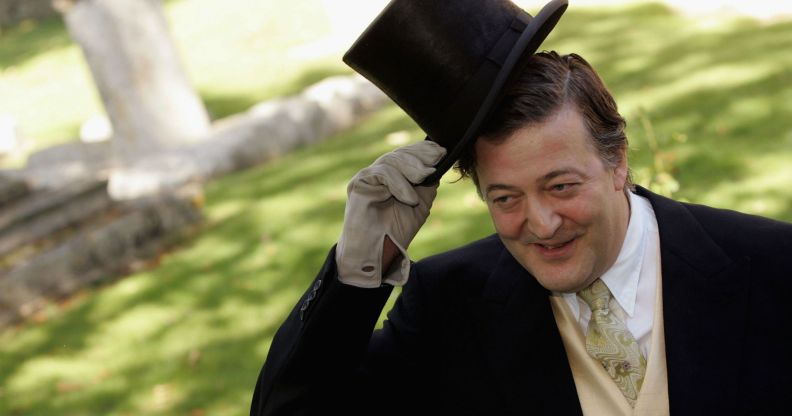Watch: Stephen Fry explains humanist wedding ceremonies in new video

Stephen Fry narrates a new video for the British Humanist Association explaining different humanist ceremonies, as calls grow for the government to legally recognise humanist weddings in England and Wales.
In the animated clip, the British icon explains the basics of a humanist alternative to a religious or civil wedding ceremony, as well as explaining humanist funerals and namings.
He says: “In an age where more and more people live their lives without religion, humanist ceremonies offer a contemporary way of satisfying the timeless need to bring significance to life’s big changes.
“Human beings have always marked the important events of life – like births and marriages – and commemorated people who have died. We do it still today, and for those of us with no religious beliefs, it’s important that we can mark these occasions with honesty, warmth and affection using words and music that are appropriate.
“A humanist ceremony is a meaningful, non-religious occasion created specifically for the people involved, to be personally meaningful. It is conducted by a trained celebrant with the skills and experience required to bring significance to every ceremony, and who works closely with families to create it.
“Humanist funerals bring people together to express and share sadness but also to celebrate the life lived, in a way that is simple and sincere. They are carefully written to ensure they are inclusive of all present. People often say afterwards how moving sincere and fitting they found the ceremony, and how much they appreciated its authenticity.
“A humanist wedding is a celebration of shared commitment based entirely on the unique aspects of the relationship of the couple. Couples have the freedom to write their own promises to each other.
“Humanist namings are reflections and acknowledgements of the joy, wonder and responsibility of bringing a child into the world, which involve not just parents but family and friends. They are chosen by parents who want the opportunity to celebrate, but also want their child to be able to decide for themselves as they get older, what they do or don’t believe about religion.”
Due to their fluid structure, humanist ceremonies can be adapted to better cater for LGBT participants and non-traditional family units.
The video comes as calls grow for the Government to give humanist weddings legal recognition.
At present, only civil registrars and a limited number of religious groups are legally authorised to carry out weddings in England and Wales. However Scotland, which has more permissive marriage laws, allows humanist celebrants to carry out legally-recognised ceremonies.
The UK government had pledged to review its stance on humanist ceremonies when the Marriage (Same Sex Couples) Act was making its way through Parliament, but despite a public consultation finding strong support, no action has been taken.
Pavan Dhaliwal, BHA Director of Public Affairs, said: “Government has dragged its feet on this issue since 2013, in spite of being given the power by Parliament to give legal recognition to humanist marriage in that year.
“Couples of nearly every religion from Judaism to Scientology and Christianity can already have a legal marriage ceremony which embodies their beliefs and values and which is conducted by someone who shares their beliefs. All we are asking for is to be afforded that same basic right. Non-religious people in Scotland have that right. People across the rest of Britain deserve it too.”
Polling carried out by YouGov for the BHA today shows that 68% of people in Britain – just under 35 million people – are aware of humanist ceremonies and 30% of people have attended one or more humanist ceremonies. Seven million people (14%) say they want a humanist funeral when they die.
Isabel Russo, Head of Ceremonies at the BHA, explained: “In Scotland, where humanist marriages are legally recognised, humanist ceremonies are now the most popular type of belief-based ceremony, and many more people are aware of humanist ceremonies and want one for themselves.
“We have a national network of trained and accredited celebrants. People have a right to be able to choose the ceremony that is right for them and need to be more aware of the alternatives on offer. That’s what we hope our new animation today will help us achieve.
“People choose us because they want a meaningful non-religious ceremony that genuinely reflects the values they hold. Working with a trained celebrant, our clients mark the most significant moments in their lives, be it the naming of a child, a marriage, or the death of someone close.
“We recognise that each of these events, while universal experiences, are unique for those closely involved. There is only one chance to get it right and we work hard to fulfil the needs of those we work with to make each ceremony the best it can be, free from the constraints of a religious context.”

